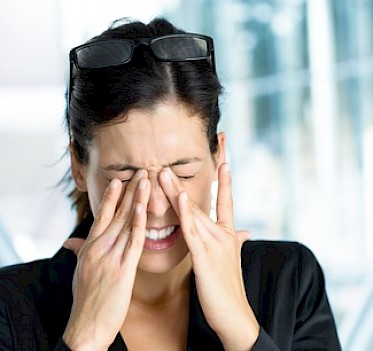What a Pain! Sinus Headaches Vs. Migraines
Headaches come in all different horrible shapes and sizes, but it can be hard to tell them apart and determine their cause. Is it stress triggered? Is it too loud or too bright? Is it caused by sinus pressure? It’s easy to confuse one type of headache for another, one of the most common mix-ups being between sinus headaches and migraines. The symptoms between the two are quite similar, though their causes are quite different.
Sinus headaches usually only occur in people dealing with a sinus infection or an illness that causes mucus to build up in the sinuses. Normal migraines have various causes, but they usually aren’t related to what is going on in your sinus cavity.
While it isn’t uncommon for someone suffering from a migraine to have their nose run, the mucus in those instances is usually clear. In contrast, mucus from a sinus headache is generally yellow or green, revealing the underlying infection. To go along with the infection, sinus headaches are accompanied by coughing and other cold-like symptoms.
Sinus headaches are often easily relieved by loosening and expelling the blocked mucus from the sinuses. You can do this by taking a hot shower, using a saline wash, or breathing in hot steam from a humidifier. Normal migraines, sadly, often aren’t that easily relieved.
Like a normal migraine, pain from sinus headaches can intensify when the person suffering from one bends over or leans forward. This happens in sinus headaches because the mucus built up in the sinuses shifts and moves the pressure to another area. Sinus headaches, though, are not worsened by noise or light like other headaches. These headaches are also not associated with causing nausea, so if you’re nauseated, odds are you’re having a migraine and not a sinus headache.
Sinus headaches also cause pain and tenderness in the face and sinuses (eyes, cheeks, and forehead). Many people who suffer from migraines experience pain in similar places, though with migraines the pain is usually localized to one side of the head. With a sinus headache, the pain will be felt on both sides. Another feature unique to sinus headaches is sinus tooth pain. The pressure caused by a sinus headache could actually cause a person's teeth (particularly the upper molars) to ache.
Try to examine the symptoms you are suffering from when you’re stricken with a headache as these can determine exactly what type it is you are suffering from. You don’t want to be treated for a sinus headache when you are suffering from a migraine— or vice versa.
